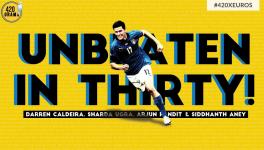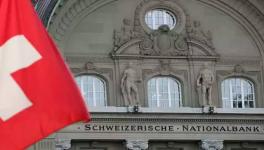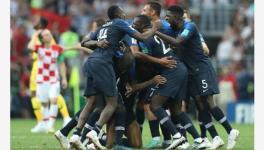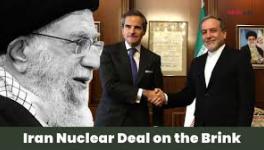Switzerland’s Albanian-origin Goalscorers Sting Serbia with Nationalist Celebrations
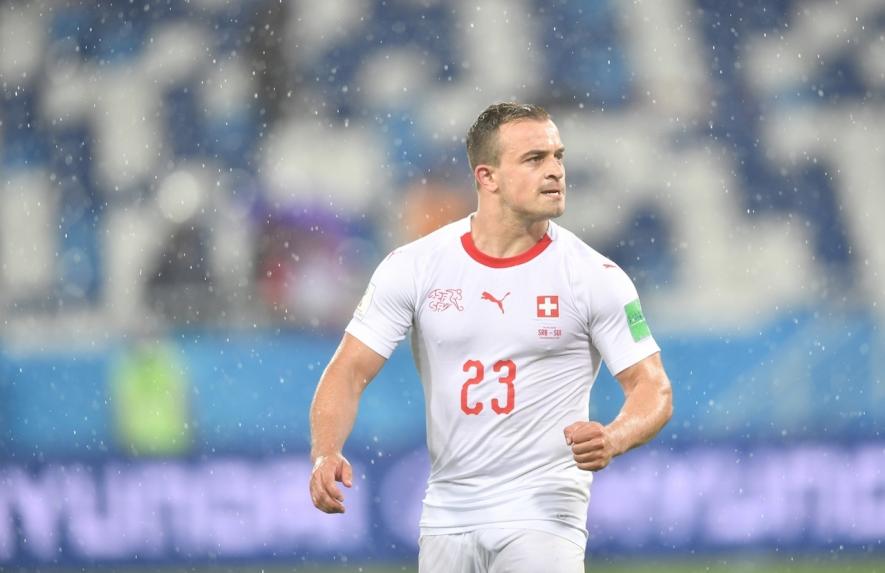
Xherdan Shaqiri capped off a blistering counterattack with the smartest of finishes in the 90th minute, to give Switzerland a comeback victory against Serbia. (Pic: IANS)
Swiss players Granit Xhaka and Xherdan Shaqiri risked escalating political tensions on Friday after celebrating their goals against Serbia with an Albanian nationalist symbol.The gesture is likely to “inflame tensions” among Serbian nationalists and ethnic Albanians in the Balkans, the Guardian claimed.
Having won their opening World Cup game against Costa Rica 1-0, Serbia went into their second clash high on confidence, knowing a second triumph would guarantee them safe passage into the knockouts. Aleksandar Mitrovic gave them the lead in the fifth minute. But, from there on, Switzerland rallied and returned in the second half with more verve.
Xhaka scored the equalizer with a fizzing, curling shot from 25 yards out, and immediately put his arms to his chest, both thumbs locked, fingers spread out mimicking an eagle -- the symbol on the national flag of Albania. In the 90th minute, Shaqiri received the ball at the centre circle and tore at Serbia's goal. His pace, at the end of the simplest of counterattacks, left Dusko Tosic and Vladimir Stojkovic in a heap on the pitch and the ball in the back of the net. The eagle flew again in what was an even more impassioned celebration.
The families of both players--ethnic Albanians--are from Kosovo. Their parents left Kosovo in the early 1990s at the time of the conflict between ethnic Albanians and ethnic Serbs. Serbia does not recognise Kosovo as an independent state. Xhaka, Shaqiri and others had signed a petition appealing FIFA to grant Kosovo membership. The doors were opened by the International Olympic Committee in 2014 and UEFA and FIFA followed suit two years later.
As a nation that is confronted by several secessionist and separatist movements, Kosovo is of significant interest to India from an international law perspective. The Indian government, along with several other including those of Russia and China, does not recognise Kosovan sovereignty. The government has maintained that it is not convinced of the legality of the declaration of Kosovan independence of 2008. More pertinently, it will not be party to setting a precedent that can then be applied to movements within India -- most significantly Kashmir.
For Xhaka it is not about politics and precedents. It is deeply personal. His father was put in prison in the late 1980s by the Yugoslavian authorities for campaigning in favour of Kosovo’s independence. Three and a half years after his release, the family shifted to Switzerland which is where the midfielder was born. Shaqiri on the other hand was born in Gjilan, Yugoslavia, now a province in eastern Kosovo.
At the 2016 European Championships in France, Shaqiri famously also disturbed the otherwise peaceful Swiss training camp by expressing a desire to play for the country of his birth.
“What if the coach of Kosovo wanted me as captain,” he said then. “Of course I’m thinking about it.” The Swiss viewed the statement as one made by a player, who, having been overlooked for the captaincy, wanted to assert his seniority in the squad. Before the World Cup, Shaqiri declared his allegiance to Kosovo by posting on Instagram a photo of his boots, a Kosovan flag stitched on the right heel. FIFA of course denied the probability of any of them turning up for Kosovo in the World Cup qualifiers later that year, seeing as they’d already represented Switzerland at a major championship.
While there is a general sense of relief among the Swiss team now -- they only need a point from their final game to qualify -- Xhaka and Shaqiri’s celebrations could spark sanctions and fines from FIFA who are as merciless with players making political/social statements during their competitions as they are with guerilla marketing.
Switzerland’s coach Vladimir Petkovic, born in Sarajevo and undoubtedly possessing his own experience of Balkan history, tried to diffuse. “It’s clear that emotions show up and that’s how things happen,” he said in his press conference. “I think we all together need to steer away from politics in football and we should focus on this sport as a beautiful game and something that brings people together.”
Valon Behrami, a third member of Kosovar Albanian heritage in the Swiss team, had a less idealistic take on Instagram. “Sports sometimes is more than sports,” he said.
(With inputs from IANS)
Get the latest reports & analysis with people's perspective on Protests, movements & deep analytical videos, discussions of the current affairs in your Telegram app. Subscribe to NewsClick's Telegram channel & get Real-Time updates on stories, as they get published on our website.











